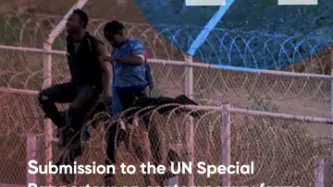Search
Content type: Advocacy
Dejusticia, Fundación Karisma, and Privacy International submitted a joint stakeholder report on Colombia to the 44th session of the Universal Periodic Review at the UN Human Rights Council.Our submission raised concerns regarding the protection of the rights to freedom of expression and opinion, to privacy, and to personal data protection; the shutdown of civil society spaces; protection of the right to protest; and protection of the rights of the Venezuelan migrant and refugee population.…
Content type: Advocacy
Today, PI filed a complaint with the Forensic Science Regulator (FSR) in relation to quality and accuracy issues in satellite-enabled Global Positioning System (GPS) tags used for Electronic Monitoring of subjects released from immigration detention (GPS tags). We are concerned there may be systemic failures in relation to the quality of data extracted from tags, processed and interpreted for use in investigations and criminal prosecutions.
The GPS tags are used by the Home Office to…
Content type: Report
Privacy International’s submissions for the Independent Chief Inspector of Borders and Immigration inspection of the Home Office Satellite Tracking Service Programme
The Home Office have introduced 24/7 electronic monitoring and collection of the location data of migrants via GPS ankle tags. This seismic change cannot be overstated. The use of GPS tags and intention to use location data, kept for six years after the tag is removed, in immigration decision-making goes far beyond the mere…
Content type: News & Analysis
Update: Based on the complaint, on 30 November 2021 the Ombudsman opened an inquiry into whether the European Commission failed to take into account human rights concerns or carry out human rights impact assessments before providing support to African countries to develop surveillance capabilities.
___
Privacy International (PI) together with a coalition of human rights groups have today called on the European Ombudsman, the EU’s oversight body, to investigate evidence that the block is…
Content type: Explainer
An array of digital technologies are being deployed in the context of border enforcement. Satellite and aerial surveillance are part of the surveillance toolkit and yet, they are also used by organisations seeking to hold government actions to account and improve efficacy of their own work. To effectively critique state use and delve into potential benefits of satellite and aerial surveillance, we must first understand it.
In this explainer we dig into a technology which many are aware of for…
Content type: Report
Privacy International has released a report summarising the result of its research into the databases and surveillance tools used by authorities across the UK’s borders, immigration, and citizenship system.
The report uses procurement, contractual, and other open-source data and aims to inform the work of civil society organisations and increase understanding of a vast yet highly opaque system upon which millions of people rely.
It also describes and maps…
Content type: Long Read
Tucked away in a discrete side street in Hungary’s capital, the European Union Agency for Law Enforcement Training (CEPOL) has since 2006 operated as an official EU agency responsible for developing, implementing, and coordinating training for law enforcement officials from across EU and non-EU countries.
Providing training to some 29,000 officials in 2018 alone, it has seen its budget rocket from €5 million in 2006 to over €9.3 million in 2019, and offers courses in everything from…
Content type: Advocacy
Privacy International (PI), Fundaciòn Datos Protegidos, Red en Defensa de los Derechos Digitales (R3D) and Statewatch responded to the call for submission of the UN Special Rapporteur on contemporary forms of racism, xenophobia and related intolerance on how digital technologies deployed in the context of border enforcement and administration reproduce, reinforce, and compound racial discrimination.
This submission provides information on specific digital technologies in service of border…
Content type: Advocacy
Privacy International responded to the call for submissions of the Working Group on the use of mercenaries as a means of violating human rights and impeding the exercise of the rights of peoples to self-determination on role of private military and security companies in immigration and border management and the impact on the protection of the rights of all migrants.
This submission builds on PI’s research and reporting highlighting examples of the involvement of private companies in…
Content type: Explainer
In a scramble to track, and thereby stem the flow of new cases of Covid-19, Governments around the world are rushing to track the locations of their populace. One way to do this is to leverage the metadata held by mobile service providers (telecommunications companies - "Telcos" - such as Hutchison 3 (Also known as Three), Telefonica (Also known as O2), Vodafone, and Orange) in order to track the movements of a population, as seen in Italy, Germany and Austria, and with the European Commission…
Content type: News & Analysis
Photo by Francesco Bellina
The wars on terror and migration have seen international funders sponsoring numerous border control missions across the Sahel region of Africa. Many of these rely on funds supposed to be reserved for development aid and lack vital transparency safeguards. In the first of a series, freelance journalist Giacomo Zandonini sets the scene from Niger.
Surrounded by a straw-yellow stretch of sand, the immense base of the border control mobile company of Maradi, in southern…
Content type: News & Analysis
Photo: The European Union
On 2 September 2019, Privacy International, together with 60 other organisations, signed an open letter to the European Parliament to express our deep concern about upcoming EU policy proposals which undermine the EU’s founding values of human rights, peace and disarmament.
Since 2017, the EU has diverted funds towards security research and security capacity-building in countries around the world. The proposal for the EU's next budget (2021-2027) will…
Content type: News & Analysis
According to the International Organization for Migration, an estimated 258 million people are international migrants – that is, someone who changes their country of usual residence, That’s one in every 30 people on earth.
These unprecedented movements levels show no sign of slowing down. It is predicted that by 2050, there will be 450 million migrants across the world.
Nowadays, it is politically acceptable to demonise migrants, and countless leaders have spewed divisive and xenophobic…












